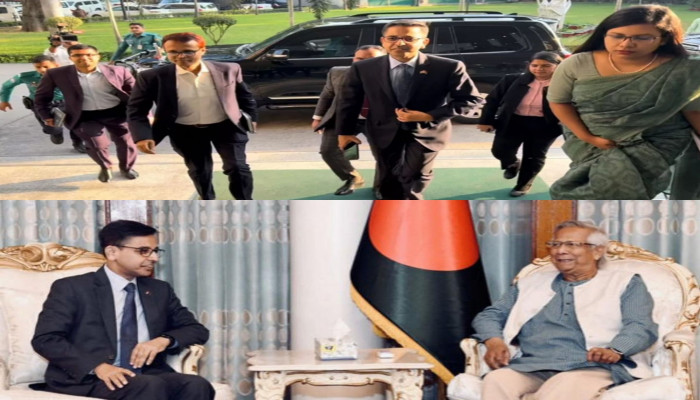Dhaka summons Indian High Commissioner over border clashes and fencing issue
- In Reports
- 01:52 PM, Jan 13, 2025
- Myind Staff
Bangladesh summoned the Indian High Commissioner Pranay Verma in Dhaka on Sunday to express its "deep concern" over recent border clashes of the Border Security Force (BSF) along the border that have raised tensions between the neighbouring countries. “Foreign Secretary Ambassador Md. Jasim Uddin today conveyed the deep concern of the Bangladesh government to Indian High Commissioner Pranay Verma at his office in the Ministry of Foreign Affairs over the recent activities of the Indian Border Security Force (BSF) along the Bangladesh-India border,” a statement from the Bangladesh Foreign Ministry said.
According to trusted sources, the conversation between the two officials lasted around 45 minutes. The Indian ambassador was summoned soon after Dhaka alleged that India was trying to build a fence at five places along the India-Bangladesh border, claiming this decision violated a bilateral agreement.
“I just met with the Foreign Secretary to discuss India's commitment to ensuring a crime-free border, effectively addressing challenges of smuggling, movement of criminals and trafficking,” Verma informed reporters after the meeting was over.
“We have an understanding about fencing the border for security. BSF and BGB (Border Security Force and Border Guard Bangladesh) have communicated in this regard. We expect that understandings will be implemented and there will be a cooperative approach to combating crime,” he counted.
The statement said that the Bangladesh Foreign Secretary “stressed that such activities, especially the unauthorised attempts to construct barbed wire fences and the related operations of the BSF, have created tension and instability on the border.”
“He stressed that the construction of barbed wire fences without proper authorisation undermines the spirit of cooperation and friendly relations between the two neighbouring countries. He hoped it would be possible to discuss the matter in detail in the upcoming BGB-BSF DG-level talks,” the statement added.
Notably, Bangladesh had voiced grave worry about the recent death of a Bangladeshi citizen by the Border Security Force (BSF) in Sunamganj. Jashim Uddin strongly denounced these kinds of crimes, urging Indian authorities to take prompt action to avoid future deaths and to probe the individuals responsible. He urged the Indian government to "advise all relevant authorities in India to refrain from any provocative actions that could escalate tensions on the shared border."
Earlier, Jahangir Alam Chowdhury, Home Affairs Advisor Lt. Gen. (retd.), said that the Border Guard Force had stopped constructing barbed wire fences on the India border due to strong opposition from Bangladesh and locals.
At a press conference, Chowdhury said that due to various unfair agreements reached during the previous government's mandate, "several issues have arisen along the Bangladesh-India border." "However, the efforts of our people and the BGB have forced India to stop some activities, including the construction of barbed wire fences,".
Chowdhury said there are four memorandums of understanding (MoUs) between Bangladesh and India to conduct border activities. "The 1975 MoU specifies that no development with defence potential can occur within 150 yards of the zero line. Another MoU states that no development activities can occur within this boundary without mutual consent. Any such work requires prior agreement between the two nations," he expressed.
The adviser stated that India has already installed a fence 3,271 kilometres of its 4,156-kilometer border with Bangladesh, leaving around 885 km unfenced.
Chowdhury further accused the previous administration, led by ousted Prime Minister Sheikh Hasina, of giving India uneven opportunity, resulting in conflicts over barbed wire fence at 160 places between 2010 and 2023. He stated that per the 1974 agreement, Bangladesh handed Berubari to India following parliamentary confirmation. In exchange, he said India was meant to provide Bangladesh access to the Tin Bigha Corridor, but it failed to honour this promise or approve the pact in its parliament.
"They would open the corridor for an hour and then close it for another hour. Finally, in 2010, an agreement was reached to keep the corridor open 24 hours daily. However, the agreement allowed India to build a border fence on the zero line at Angarpota, violating the 150-yard rule," Chowdhury stated.
"Now, even though we are opposing this construction, we are facing challenges because Bangladesh is a signatory to the 2010 agreement," he spoke, counting that the foreign ministry had taken up the issue diplomatically.







Comments